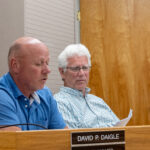
PRESQUE ISLE, Maine — The state’s recent recognition of the Mi’kmaq Nation’s right to self-govern now means the real work begins for the tribe.
Gov. Janet Mills signed the Mi’kmaq Restoration Act into law on June 30, recognizing the tribe’s federal status. Now the Mi’kmaq Nation needs funding to build infrastructure, such as a courthouse, or a police station, according to Edward Peter-Paul, chief of Mi’kmaq Nation.
Peter-Paul said the bill reshapes the relationship between the Mi’kmaq tribe and the state government, providing the tribe more authority over its lands. It will open up more opportunities to bring more money to Aroostook County and create more employment, he said.
The Mi’kmaq Restoration Act ensures the tribe has the same jurisdictional rights and benefits over its internal tribal matters, regulatory authority over natural resources, and substance fishing rights that were also given to the Passamaquoddy, Wabanaki and Penobscot Nations.
Mi’kmaq Nation’s agreement with the Maine Legislature allows the Mi’kmaqs to apply for any federally funded grants or loans needed to build government structure and infrastructure necessary for self-governance.
Residents of the Mi’kmaq Nation Trust Land will be eligible to receive any state grant or loan, according to language in LD 1620.
“This is a time for growth for us, because we haven’t had these rights,” Peter-Paul said. “This is what we have been fighting for since 1989.”
All of the Mi’kmaq Nation land is in fractured parts of Aroostook County with a large parcel of 800 acres at Loring Air Force Base and another 800 acres in Caribou that includes Spruce Haven and the Mi’kmaq Farms & Fish Hatchery.
Only 3,000 acres of the tribe’s 6,000 acres in Aroostook County falls under the jurisdiction of the Mi’kmaq Nation’s self-governance. The land needs to be in federal trust in order for the Mi’kmaq Nation to have jurisdiction over their land. Half of its acres are in the federal trust with the other half in process of getting put into the trust.
For now, the Mi’kmaq Nation won’t regulate drinking water, but it will have the authority and option to do it if it wishes.
Mi’kmaq property will be tax exempt from state income tax for any tribal member living on it. The tribe also will be able to come up with a local tax rate on their lands that will benefit the tribe.
The Mi’kmaq Nation, which now can have a legal system, is working to establish a location for its court on its land. At first the Mi’kmaq Nation planned to establish a separate court for the Indian Child Welfare Act, but that area will now be rolled into one court system, Peter-Paul said.
If a non-native person gets charged with a crime on Mi’kmaq Nation land, that person would have a choice to waive their rights in a Maine court to be judged in the Mi’kmaq Nation court or proceed in the Maine court system.
The Mi’kmaq court system will be able to handle any crimes that are not felonies or result in more than a year in jail and administer corrective actions to help rehabilitate their people. A couple of examples for corrective actions are counseling, or community service, according to Peter-Paul.
The tribe’s journey to self-governance has been a difficult one.
In 1989, the Mi’kmaq Settlement Act was put forward to the tribe. But the tribe didn’t agree to some of the language in it with one sticking point being restrictions that would put Mi’kmaq land completely under the state’s jurisdiction, Peter-Paul said. The tribes never ratified the act. The most recent legislation in LD 1620 changes the language so that the tribes have jurisdiction over their own land.
Another problem was a clause in the Maine Indian Land Claims Settlement of 1980 that stated any Native Americans, other than the Passamaquoddys and the Penobscots, shall be fully subjected to the laws of the state, Peter-Paul said.
In the mid-1960s the Micmacs and Maliseets formed the Association of Aroostook Indians in Houlton. The two tribes separated when the Maliseets achieved federal recognition in 1980 with the Mi’kmaqs becoming the Aroostook Micmac Council before gaining federal recognition on Nov. 26, 1991, and changing its name to the Aroostook Band of Micmacs for the state’s purposes.







